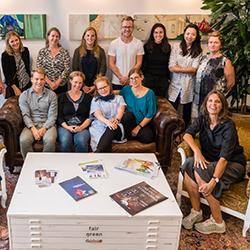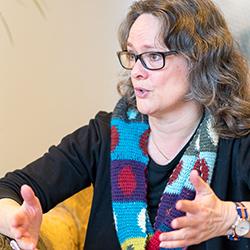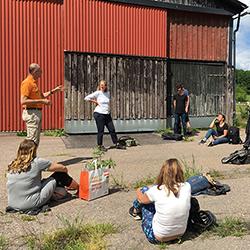Co-producing urban knowledge
A way to tackle one of the greatest challenges of our time
Sustainable urban development is one of the greatest challenges of our time. Cities face the challenges of changing climates, large demographic changes, stressed relationship with hinterlands, complex governance structures and increased segregation.
The Sustainable Development Goals have been set out by the UN in order to reduce social inequalities worldwide, which also puts the cities under deep pressure, as the highest income layers is connected to unsustainable living patterns. How can we tackle these challenges? An integrated approach is necessary.
NEW RESEARCH APPROACHES
To reach knowledge about a process of change towards a just and sustainable society, new research approaches are emerging. These innovative approaches take place out of necessity but also as part of an intentional qualitative transformation of the research process itself.
“Co-produced research is such an emerging approach, addressing the complexity of these challenges by integrating different research actors into the same creative process. The outcome is a new kind of research.”, says Professor Merritt Polk, University of Gothenburg.
The new research is transdisciplinary and developed in the emerging fields between disciplinary spaces. It also aims to be transformative, meaning changing present patterns of behaviour into more just and sustainable forms.
“At Mistra Urban Futures we have been have been working with co-production and a transdisciplinary approach since 2010. Beyond that, we have also carried out research in the field as such, to be able to learn and develop our approaches. We have now gathered our knowledge as a course Co-producing knowledge – From practice to theory”, says Henrietta Palmer, Deputy Scientific Director, Mistra Urban Futures.
TACKLING WICKED URBAN PROBLEMS
This course is divided into two parts, (2 x 7,5 ECTS), and directed for you who are dealing with so called ‘wicked urban problems’ in your daily practice or who aim to address such current and future urban challenges in your PhD research, and who see the urgency for a transdisciplinary approach. This course gives insight into urban dilemmas from both practice and academic research perspectives and provides tools, methods and theory for transdisciplinary research.
ABOUT THE COURSE
The course will start fall 2017, and the last day for applications is May 29th, 2017 (for the fall course) and Nov 17th, 2017 (for the spring course). The course is carried out by Mistra Urban Futures/ Chalmers. Lecturers will be both national and international from the Mistra Urban Futures network.
Read more about the Course Plan and how to apply here.
Read more about the Research School
FURTHER QUESTIONS?
Please contact Henrietta Palmer, Deputy Scientific Director, Mistra Urban Futures, Henrietta.palmer@chalmers.se.





